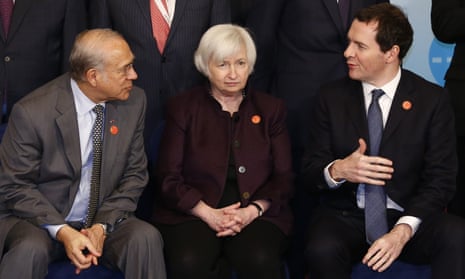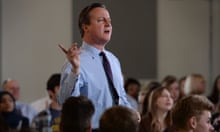Britain’s possible exit from the European Union could pose a risk to the world economy, the G20 finance ministers’ summit in China has agreed, according to the chancellor, George Osborne.
Osborne said fellow finance ministers and central bank chiefs had unanimously concluded that a vote to leave the EU by Britain would be one of the biggest economic dangers this year.
According to a draft communique, the meeting in Shanghai also agreed to use all policy tools to lift sluggish global growth, despite German disquiet over fiscal and monetary stimulus.
The G20 ministers were seeking policy solutions amid growing concern about the headwinds facing the global economy, principally concerns about growth in China and the US.
After years of money printing and historic low interest rates across much of the developed world, the outlook for growth is still uncertain and the communique seen noted that monetary policy alone could not bring balanced growth, the reports said.
“The global recovery continues, but it remains uneven and falls short of our ambition for strong, sustainable and balanced growth,” it said.
“Monetary policies will continue to support economic activity and ensure price stability ... but monetary policy alone cannot lead to balanced growth.”
The draft suggested that markets’ recent ructions have been overreactions to economic anxieties that do not reflect economic fundamentals, the reports said, not helped by threats such as Britain’s possible exit from the EU and the European refugee crisis.
The draft’s noted “the shock of a potential UK exit from the European Union” in the seventh line of its text.
It added: “While recognising these challenges, we nevertheless judge that the magnitude of recent market volatility has not reflected the underlying fundamentals of the global economy.”
It added that ministers pledged not to engage in beggar-thy-neighbour currency devaluations which could unleash a wave of dangerous deflation through the global economy.
Osborne said in a statement that G20 finance ministers and officials were unanimous that a possible British exit from the European Union would be a shock to the global economy.
“Here at the G20, finance leaders and central bank governors of the world’s biggest economies have raised serious concerns about the risks posed by a UK exit from the EU,” Osborne said in a statement from Shanghai.
“They have concluded unanimously today that what they call the shock of a potential UK vote to leave is among the biggest economic dangers this year.”
The G20 Brexit warning will be welcomed by the prime minister David Cameron as he tries to make the case for the UK to stay in the EU when the referendum is held on 23 June.
His cause has been dealt a blow by the declaration of the London mayor Boris Johnson for the leave camp.
But the G20 statement would come with the endorsement of not only Osborne but also Bank of England governor Mark Carney and would be the latest in a series of red flags from the business world. Others have included the The credit agency Moody’s and IMF chief Christine Lagarde.
Earlier, Osborne also warned in Shanghai that problems were brewing for the world economy and that could impact Britain’s economy.
He said: “The storm clouds are clearly gathering in the world economy and that has a consequence for lots of countries including Britain. Now we are weathering it better than most, but we’ve just had confirmation that our own economy is not as big as we had hoped.
“So we may need to undertake further reductions in spending because this country can only afford what it can afford and we will address that in the budget, because I’m absolutely clear we’ve got to root our country in the principle that we must live within our means and we have economic security.”








Comments (…)
Sign in or create your Guardian account to join the discussion